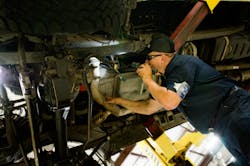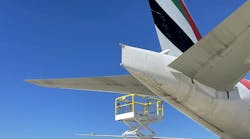As someone who has been involved with ground support equipment maintenance for decades, Dewey Kulzer of Daifuku Elite Line Services (ELS) has seen trends change.
Outsourcing GSE maintenance became more prevalent approximately 15 years ago to help offset economic pressures. Then later, carriers began performing more of their maintenance needs in-house.
Now, Kulzer says he often sees companies choosing to entrust the majority of their maintenance requirements to one company, like ELS, rather than relying on multiple parties, such as FBOs, ground handlers and other service providers, to perform specific tasks.
“Carriers might be managing tons and tons of suppliers, which takes major effort by them to manage their activities, manage their quality, manage their people – all of those functions,” Kulzer says. “Now, they are re-looking at how they’ve outsourced that, and they’re now regionalizing and pulling them under a few suppliers that are much higher quality than a lot of the other stuff they’ve found.
“It’s not driven by equipment type or equipment need, it’s driven totally by cost and ability to support,” he adds.
Using fewer maintenance providers can increase productivity and dependability. Kulzer also points out that labor is often the highest cost associated with in-house maintenance, and that expense can be reduced by outsourcing.
To deliver the appropriate level of service, maintenance providers need to have a broad, overall knowledge of the equipment they’re repairing. Additionally, mechanics receive specialized training to become experts with specific matters.
“The environment on the ramp doesn’t change that fast. They’re bringing in awesome, new equipment. But that old 1990 tractor is still out there too,” Kulzer explains. “So you’re maintaining, literally, farm-yard level technology to the latest, computer-driven stuff.
“I have guys that are much better in electric equipment and electronics and stuff like that,” he continues. “So when an average mechanic that we’ve trained can’t figure it out one of those technical problems, the pro goes and helps him.”
Maintenance providers like ELS also have mobile mechanics that can be dispatched from other stations to assist when others are short-handed or having other difficulties.
Able to work within a carrier’s preventative maintenance schedules or build programs for a customer, dedicated maintenance providers also provide simplicity and dependability for customers – in addition to potential cost savings, Kulzer notes.
“With the multiple suppliers that carriers may be dealing with today, it takes multiple people on their staff to do that,” he says. “By outsourcing, all of sudden it reduces their needs to where they can utilize that staff for something else. They don’t have to devote 10 or 15 people to manage all these different functions.
“In today’s world, when they’re looking at outsourcing, they can’t look at it as a one-off type deal,” Kulzer concludes. “The greater benefits are looking at it as a more regional, holistic view. How can they get the maximum benefit?”







